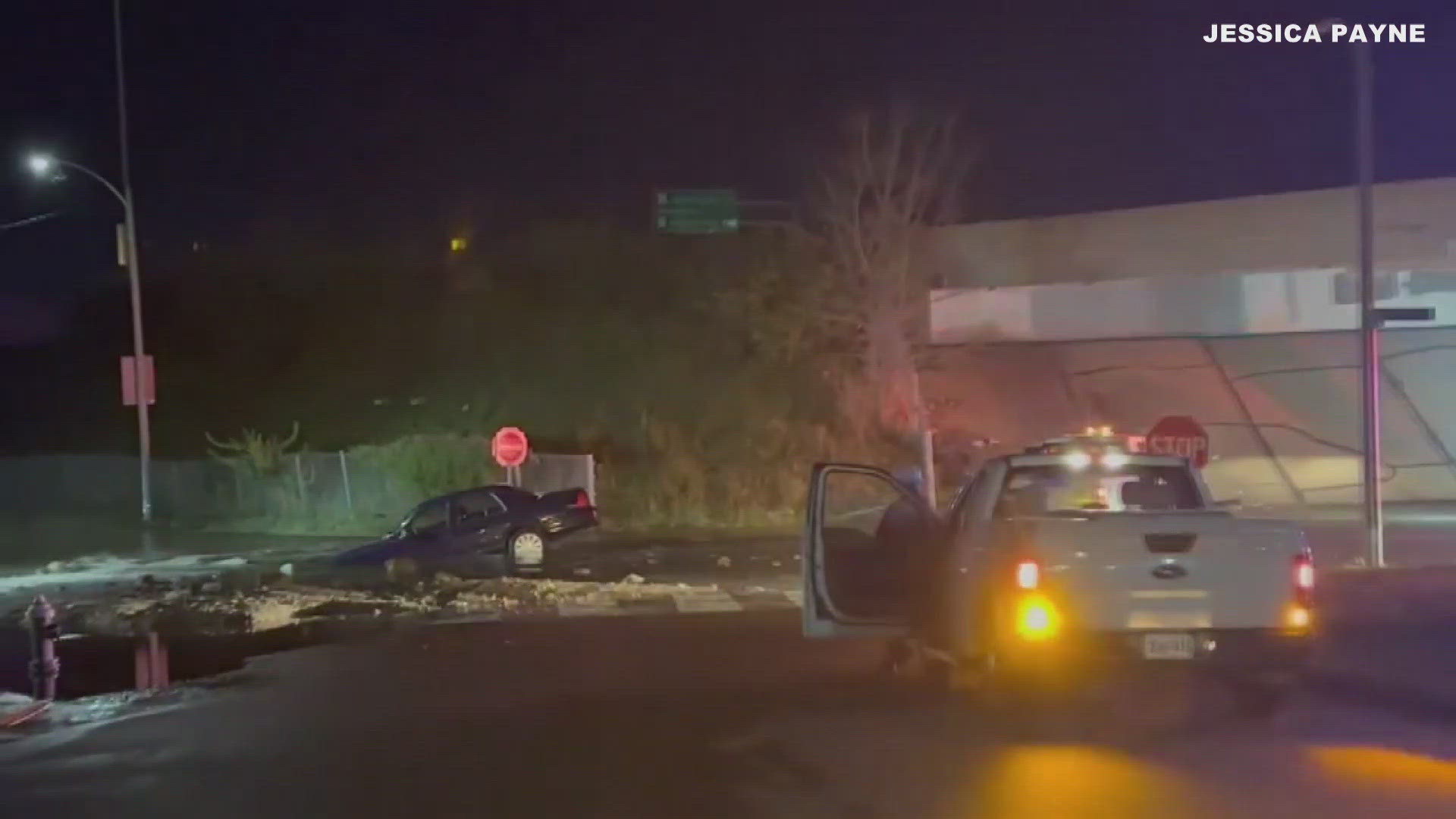ST. LOUIS — The three largest St. Louis police groups filed a lawsuit Tuesday against the City of St. Louis, alleging the recent passage of a civilian oversight bill violates state law.
The St. Louis Police Officers' Association, the Ethical Society of Police and the Police Leadership Organization filed the joint lawsuit against the city as well as Mayor Tishaura Jones, Public Safety Director Dan Isom, Civilian Oversight Board Commissioner Mattew Brummund and the three members of the Civil Service Commission including Bettye Battle-Turner, Dean Kpere-Daibo and Steve Barney.
"Violating Missouri state law does not promote the goals of fairness, equity and transparency that the ordinance purportedly seeks, and could result in less cooperation from police officers who lack faith and trust in the Civilian Oversight Board Ordinance and process," according to the lawsuit.
The St. Louis Police Officers Association is the collective bargaining unit for city officers. The Ethical Society is a membership organization that represents primarily Black officers and The Leadership Organization represents sergeants.
Jones' spokesman Nick Desideri sent a statement to 5 On Your Side, which read: "While we cannot comment on pending litigation, Mayor Jones has emphasized that improving public safety requires building trust between police and the community, with accountability being the foundation of that trust -- especially eight years after the death of Mike Brown, Jr. and the protests in Ferguson that sparked the formation of the Civilian Oversight Board."
Jones accused the Ethical Society of Police of lying on its Facebook page after the membership group issued a statement accusing her administration of excluding them from discussions about a controversial civilian oversight bill.
Jones signed Board Bill 47 Aug. 3, which she said will hold officers more accountable by creating a Civilian Oversight Board that the police union says has the power to discipline officers, review personnel records and all categories of complaints levied against officers.
The statement signed by the Ethical Society's board that drew Jones’ ire read: “Today, the City of St. Louis Board Bill 47 was signed. Though ESOP along with the other two labor unions opposed the bill, we understand the need for a civilian oversight board. We were never brought to the table to provide insight for the bill, which was written too broadly. We've had discussions with the other two labor unions and are in agreement that there needs to be fair representation in amending the bill. ESOP is concerned that, if it is not implemented carefully, good officers could be targeted by persons with a hidden agenda against law enforcement."
Jones replied to the Facebook post with, “That's not true and is a bold-faced LIE. We've been talking about this bill for nearly a year. Ald. Clark Hubbard had three hearings and you didn't show up and testify. I had quarterly meetings with your leadership and no one said a word. Again, if you're a good officer, you have nothing to worry about. I thought ESOP stood for holding bad actors accountable? I think you should give the law a chance to work before suggesting amendments. Be blessed.”
RELATED: 'A bold-faced LIE': St. Louis mayor blasts Black police officer group’s criticism of oversight bill
The Ethical Society of Police then responded to her post with, “It is not our intent to publicly debate the extent to which input from our organization and others was sought during the crafting of this legislation. Our only intent is to ensure this legislation doesn’t have an unintended negative impact on the Department and the community. Waiting until damage has been done is neither wise nor an attribute of an effective leader.
We strongly object to the Mayor's unprofessional response and attempt to degrade our organizational values or marginalize our commitment to the fair and equitable treatment of the community we serve. ESOP has been and will always be about accountability, and we welcome an oversight board. We are calling for the thoughtful implementation of this bill and input from organizations that represent constituents. This should be welcome, not controversial.”
Jones responded back with: “Ethical Society of Police, you don’t want to publicly debate this but you made a public statement on a public platform and didn’t attend any of the public hearings to publicly express your thoughts and insight about the bill when it was being debated…in public. Might I add that your former president, who is now the Deputy Public Safety Director, was at the table for almost every discussion of this bill. I frequently heard her push back and change several provisions with every day officers in mind. Heather (Taylor) brings her entire lived experience as an officer and as former president of ESOP to the table with her every single day. Are you also saying that she’s wrong? Again, if you’re a good officer, you don’t have anything to worry about.”
On Friday morning, the Ethical Society of Police responded.
"We did not want to get into the weeds with the Mayor of the City of St. Louis on social media. However, the continued allegations that we are lying must be corrected.
"The leadership of the Ethical Society of Police was unaware of Board Bill 47 until June 2022. We were not informed of any public hearings or invited to provide input. The bill was not brought up with the Mayor because we were not aware of the bill any of the times we met. She did not bring it up.
"On June 27, 2022, at the 18th Ward Community Meeting, the ESOP President expressed to the citizens that ESOP was in support of a Civilian Oversight Board (COB), but we could not support the bill as it was written because the language was unclear. Alderwoman Clark-Hubbard was present at this meeting.
"There was no further outreach or invitation for input until Alderwoman Clark-Hubbard sent an email to the ESOP President on July 12, three days before voting. We felt it was too late to hold a meeting and dissect this lengthy and broad bill. We informed her after the ESOP general membership meeting that we could not support the bill and it 'should be shelved until it is amended to be fair to those officers and civilians of the SLMPD.'
"During the week of voting, we made two official statements detailing our specific concerns with the bill and encouraging the public to vote against the bill in its current form. We have made it clear that we support the Civilian Oversight Board and officers should be accountable for use-of-force incidents.
"While the Mayor is speaking disrespectfully by saying we Bold Face Lie, we are the same officers who are voters and residents and who endorsed her for Mayor. We do not understand this unprofessional approach to question the integrity of an organization that advocates for officers instead of addressing real concerns in the bill, such as how a teenager could be allowed to sit on the COB. Let's discuss our concerns and how the bill can be implemented to mitigate those concerns."
The St. Louis Police Officers Association is one of the labor associations ESOP referenced in their statement. The union’s attorney Brian Millikan said the issue with the city’s ordinance is not about whether an officer is a good one or not – it’s about protecting their rights as citizens.
“What we’re concerned with is the ordinance has to comply with state law and it needs to comply with basic due process requirements afforded under the law,” Millikan said. “For us, this is more about complying with state law and giving city employees due process.”
The police union is preparing to file a lawsuit against the city because of the bill, Millikan said.
“The state statute authorizes cities to create civilian review boards, and I stress ‘review’ that’s what the statute allows,” Millikan said. “It allows them to investigate, review and make recommendations to the agency on what the review board believes should be appropriate discipline. This goes way beyond that.”
The state statute also identifies categories of complaints civilian review boards can review, but the city’s new bill gives the civilian oversight board the power to review complaints carte blanche, Millikan said.
“It also violates numerous provisions of the Police Officer Bill of Rights and allows investigators to compel officers to immediately answer questions about any use of force or internal investigation on a citizen complaint,” Millikan said.
One of the key provisions of the city’s bill that violates the Missouri Police Officer’s Bill of Rights requires officers to give statements immediately following an incident, Millikan said.
“Police officers have 24 hours to obtain counsel prior to being interrogated,” Millikan said.
And the city’s bill also allows statements officers give to Internal Affairs investigators to be used against them in criminal investigations – which violates one of the most established laws known as the Garrity rule. It’s based on a case called Garrity v. New Jersey in which the court decided statements officers are forced to give as a condition of their employment cannot be used against them in a criminal investigation.
“The city’s ordinance calls for a comingling of information between the criminal and internal investigations,” he said. “Officers are citizens of this country and have constitutional rights against self-incrimination just like anyone else.
“In an internal investigation, they don’t have the right to remain silent. The Supreme Court has said officers are immune in those situations from having those statements used against them otherwise it violates their fifth amendment privilege to remain silent.”
Millikan said the police union is also concerned about the dissemination of a police officer’s personnel records, as the city’s ordinance calls for public reports from the Civilian Oversight Board.
"Accountability is the first step of building trust," said Jones in a news conference regarding the bill signing Wednesday.
Jones said good law enforcement officers should continue to serve the community and bad officers would be held accountable.
"We've never worked so hard on a bill we pray we never have to use," said Alderwoman Shameem Clark Hubbard.
Dan Isom said it was a step to strengthen trust between the public and police.
"The division of civilian oversight builds on our current accountability system giving our oversight process actual teeth with more investigative and subpoena power, the division will take the role of Internal Affairs in conducting investigations into use of force and allegations of officer misconduct," Isom said.
The Ethical Society of Police released this statement Tuesday:
"This lawsuit is not against the Citizen Oversight Board (COB) nor the citizens of the City of St. Louis. We have opposed the language of this particular bill because we are concerned with its broadness. For example, a teenager could be on the COB.
ESOP would like to be involved with both the creation and implementation of legislation as it pertains to law enforcement reform. We are committed to the best interests of officers as well as the citizens of St. Louis."



